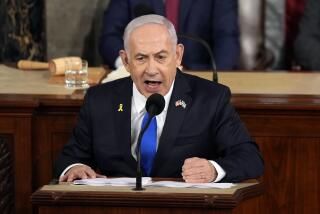Berman, Arms-Control Advocates Decry Possible F-15 Sales to Saudis : Weapons: The congressman, a leading supporter of Israel, rebuts McDonnell Douglas’ claims of job losses if the fighter jets are not built.
WASHINGTON — U.S. Rep. Howard L. Berman (D-Panorama City) launched a preemptive strike Wednesday against the possible sale of 72 fighter jets to Saudi Arabia.
Berman is a leading congressional supporter of Israel, which has consistently opposed the sale of sophisticated weapons to Saudi Arabia.
Berman, a member of the House Foreign Affairs Committee, held a news conference to denounce tactics that McDonnell Douglas Corp., manufacturer of the F-15 fighter jets, five other defense contractors and six labor unions are using to promote the sale. He said McDonnell Douglas was advancing “misleading and even deceptive” claims that if Congress rejects the sale, 86,000 jobs could be lost.
The aircraft sale has not yet been proposed in Congress. Caleb Rossiter, director of an arms-control advocacy group known as the Project on Demilitarization and Democracy, predicted that the Bush Administration may propose the sale before or just after the November election, but the White House would not comment on the timing. The arms sale would go through unless Congress votes to block it.
“The truth is that worldwide demilitarization and conversion to a peacetime economy would create far more jobs than the alternative proposed by the arms industry: that the United States become the premier arms pusher to the world,” Berman said.
McDonnell Douglas officials say 7,000 of its own jobs, 33,000 jobs with subcontractors and 46,000 “indirect” support jobs in communities where plants are located would be jeopardized if the sale is blocked. Hughes Aircraft, which makes the radar used in the planes, would lose at least 600 jobs at its El Segundo plant, a spokesman said.
Those figures are grossly exaggerated, said Greg Bischak, director of the National Commission for Economic Conversion and Disarmament, at the news conference.
Equally misleading, according to Berman and other arms-control advocates present, is McDonnell Douglas’ claim that the sale would incur no cost to the taxpayers. Instead, they said, allies such as Egypt, Israel and Jordan would demand more American help to sustain the balance of power in the region.
That would lead to the “spiraling kind of arms race that created the kind of conditions that led to the Persian Gulf War,” said Berman, who voted to authorize the war.
The United States has allowed Saudi Arabia to purchase F-15s in the past, but Congress rejected an additional shipment in 1986. Saudi Arabia bought British-made Tornados instead, and this would happen again if Congress blocks the sale, McDonnell Douglas officials say.
The U.S. Air Force does not plan to order more F-15s, and McDonnell Douglas’ bid to sell the planes abroad amounts to an effort to avoid the more difficult task of shifting to commercial aerospace products, Rossiter said.
But McDonnell Douglas spokesman Lee Whitney argued that, with orders from commercial air carriers declining, the company cannot realistically save jobs by expanding commercial production. And many small subcontractors, he added, cannot afford the new equipment and training necessary to shift production to other types of goods.
“We are getting squeezed by both sides,” Whitney said.
The last F-15s ordered by the Air Force are in production, and the line will be shut down in two years if Congress rejects the sale to Saudi Arabia, he said.
Berman said he also plans to introduce legislation that would force defense contractors to disclose the money they spend to promote arms sales to foreign countries. Current law does not require full disclosure of such efforts by lobbyists.
More to Read
Sign up for Essential California
The most important California stories and recommendations in your inbox every morning.
You may occasionally receive promotional content from the Los Angeles Times.










